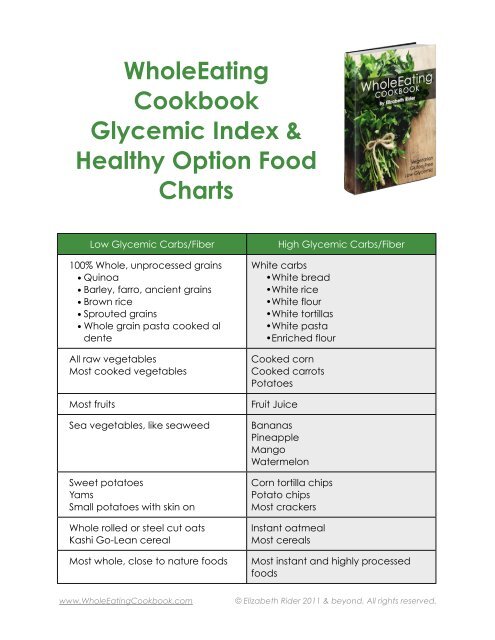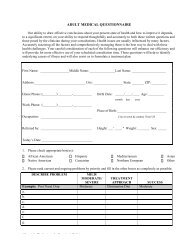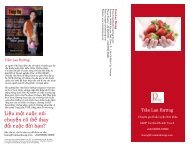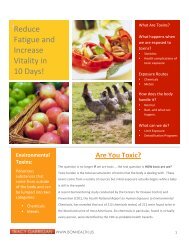Glycemic Index Food Summary - Whole Eating Cookbook.pdf
Glycemic Index Food Summary - Whole Eating Cookbook.pdf
Glycemic Index Food Summary - Whole Eating Cookbook.pdf
Create successful ePaper yourself
Turn your PDF publications into a flip-book with our unique Google optimized e-Paper software.
<strong>Whole</strong><strong>Eating</strong><br />
<strong>Cookbook</strong><br />
<strong>Glycemic</strong> <strong>Index</strong> &<br />
Healthy Option <strong>Food</strong><br />
Charts<br />
Low <strong>Glycemic</strong> Carbs/Fiber High <strong>Glycemic</strong> Carbs/Fiber<br />
100% <strong>Whole</strong>, unprocessed grains<br />
• Quinoa<br />
• Barley, farro, ancient grains<br />
• Brown rice<br />
• Sprouted grains<br />
• <strong>Whole</strong> grain pasta cooked al<br />
dente<br />
All raw vegetables<br />
Most cooked vegetables<br />
White carbs<br />
•White bread<br />
•White rice<br />
•White flour<br />
•White tortillas<br />
•White pasta<br />
•Enriched flour<br />
Cooked corn<br />
Cooked carrots<br />
Potatoes<br />
Most fruits Fruit Juice<br />
Sea vegetables, like seaweed Bananas<br />
Pineapple<br />
Mango<br />
Watermelon<br />
Sweet potatoes<br />
Yams<br />
Small potatoes with skin on<br />
<strong>Whole</strong> rolled or steel cut oats<br />
Kashi Go-Lean cereal<br />
Corn tortilla chips<br />
Potato chips<br />
Most crackers<br />
Instant oatmeal<br />
Most cereals<br />
Most whole, close to nature foods Most instant and highly processed<br />
foods<br />
www.<strong>Whole</strong><strong>Eating</strong><strong>Cookbook</strong>.com © Elizabeth Rider 2011 & beyond. All rights reserved.
Oils<br />
• Extra virgin olive oil<br />
• Cold-pressed flax oil<br />
• Macadamia nut oil<br />
• Avocado oil<br />
• Coconut oil<br />
Nuts (raw is always best)<br />
• Almonds<br />
• Walnuts<br />
• Pecans<br />
• Pine nuts<br />
• Cashews<br />
Healthy Fats Less Desirable Fats<br />
Seeds (raw is always best)<br />
• Hulled sunflower seeds<br />
• Pumpkin seeds<br />
• Flax seeds, always use ground<br />
flax - it absorbs better<br />
• Chia seeds<br />
Oils<br />
• Peanut oil<br />
• Vegetable oil<br />
• Canola oil<br />
• Soybean oil<br />
*Buy organic if you use these at they<br />
are highly genetically modified in the<br />
US<br />
Peanuts and peanut butter should be<br />
consumed in moderation, they are<br />
heavily processed in the US. Always<br />
opt for 100% natural peanut butter<br />
over commercial brands.<br />
Animal fat in general is saturated,<br />
something we want to limit.<br />
Red meat<br />
• Limit to no more than twice per<br />
month<br />
Salmon Cheese<br />
• Avoid heavily processed cheese<br />
and all cheese in mass quantities<br />
• Think of cheese as a condiment, not<br />
a main dish :-)<br />
Avocados<br />
• Goat’s milk and sheep’s milk<br />
cheeses are more easily digested<br />
and better for you<br />
• Goat cheese, there are so many<br />
varieties now: hard, soft, blue,<br />
Olives<br />
etc.<br />
• Sheep’s milk feta - Real feta is<br />
traditionally from sheep’s milk<br />
• Pecorino Romano is made with<br />
sheep’s milk and very similar to<br />
real parmesan<br />
• Unpasteurized (aka raw) cheese<br />
is easier to digest because it<br />
contains enzymes, just do not<br />
consume if you are pregnant.<br />
www.<strong>Whole</strong><strong>Eating</strong><strong>Cookbook</strong>.com © Elizabeth Rider 2011 & beyond. All rights reserved.
Healthy Proteins Less Desirable Proteins<br />
Plant<br />
• Hemp protein/hemp seeds<br />
• Legumes<br />
• Beans, black, white, kidney,<br />
pinto, etc.<br />
• Lentils<br />
• Peas<br />
• Edamame (soy beans)<br />
• Nuts and seeds, almonds<br />
especially<br />
• Sprouts<br />
Animal<br />
• Plain greek yogurt<br />
• Salmon<br />
• Tuna<br />
• Most wild-caught fish<br />
• Organic turkey or chicken -<br />
whole breasts, avoid deli meats<br />
• Pork tenderloin is OK in<br />
moderation<br />
• Eggs, if you’re not allergic, are<br />
great. 1-2 per day is perfectly<br />
healthy, look for free range and<br />
organic when possible.<br />
Less Desirable Proteins<br />
Meats and dairy should be consumed<br />
in moderation, and always choose<br />
organic.<br />
Lean turkey and chicken is good, be<br />
sure it’s organic and not charred as<br />
the char on meat is a carcinogen.<br />
Lean pork is also an OK option, just<br />
stay away from highly processed<br />
sausages and pork products.<br />
Choose plain yogurt, and greek is<br />
best. You can add natural sweeteners<br />
to it to make it taste delicious.<br />
Opt for wild-caught fish, they are<br />
higher in omega-3 fatty acids.<br />
Game meat is often very lean and<br />
natural; if you care for the taste it’s<br />
fine to eat.<br />
Duck, Cornish game hen and other<br />
less common meats are ok in<br />
moderation.<br />
Healthy Sweeteners Unhealthy Sweeteners<br />
Consume in moderation:<br />
• Agave Nectar Syrup<br />
• Raw Honey<br />
• Grade B Maple Syrup, in limited<br />
amounts<br />
• Dates and date paste<br />
• Pure Stevia<br />
• All artificial sweeteners<br />
• Splenda, Nutrisweet, Equal, etc.<br />
• All white sugar<br />
• High-Fructose Corn Syrup<br />
• Karo/Corn Syrup<br />
• *Sugar in the Raw/Brown Sugar<br />
(high-glycemic, but better for you<br />
than white sugar as it contains<br />
some nutrients.)<br />
www.<strong>Whole</strong><strong>Eating</strong><strong>Cookbook</strong>.com © Elizabeth Rider 2011 & beyond. All rights reserved.
















